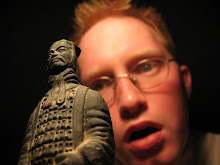
I am learning that 15-year olds are 15-year olds all over the world. When culture meddles in the business of biology, only the surface changes. Are Chinese students different than American students? Yes, of course. But what lies beneath all of them are the same needs, the same passions, the same struggles.
But there are distinguishable differences. Compared to American students...
+Chinese students are more polite.
+Chinese students are more respectful.
+Chinese students are more personal... (particularly with young foreign teachers)... they will ask for your telephone number, your QQ number; they will invite you to their homes and they will ask to be invited to your home; they will ask you all the personal questions--"are you married?", "how old are you?" "how much money is this school paying you each month?;" in short, they will ask to be treated as your friend.
-Chinese students are more passive... they don't volunteer easily
-Chinese students cheat often and cheat openly when playing games... they don't mind that their cheating nullifies all fun and purpose of the game.... they just want to win

Chinese students are also different because the education system is different.
-Students are in school all day; om they wake up at 5:00 or 5:30 to begin their day. Their final class dismisses at 10:10. Sometimes I see flashlights in the classrooms well past 11:00. I estimate that most students go to bed somewhere between 11 and 12.
-Chinese education system is exam-focused... in fact, exam centered. It appears to me that there is no such thing as "passing a class." They take frequent exams, but even these only serve to determine which class they will be placed in (the class with the "good" teacher or the class with the "bad" teacher?) and which school they will be placed in (the "key" school or the underperforming school?)... they don't get summative report cards... they don't get calls to parents... they don't get "held back" a year... For twelve years, they go to class each day, they take exams each month all in their drive toward the one and only test that truly matters: the university entrance exam. The teachers teach to the test; the students learn to the test (via rote memorization). As our Buckland trainer informed us, "China's public education system is one in which the very tip of the tail wags the dog."
-This exam changes the way students behave.
**They are tired... studying all day exhausts them even more than playing video games all night exhausts American students... and to be honest, I am not yet convinced that their style of studying is any more beneficial than playing video games anyways.
**Most of them are sponges, not thinkers... there are plenty of brilliant ones though, and they make my day!
**They are calculating machines... they are a good with numbers, equations, and calculations because they can memorize them (American students could learn a lesson here, for sure). But then there is so much deadweight! I recall, for example, a conversation with one of my Chinese students. I told him that when I was in high school, geography was one of my favorite subjects. He stared back at me with a look of disbelief and horror on his face. I then probed to find out what they studied in geography... he told me a sample question from the exam... "If it is 8:00 am in Beijing, what is the time in San Fransisco?" ... the horror was transplanted to my face...
**They become experts in the judgement of utility... they decide whether to listen to or ignore the teacher based on how well he can prepare them for the exam. If a teacher gives too many fishy answers or, heaven forbid, too many "I don't know" answers, the students will ignore the teacher. And then there is my situation. I teach oral English... I help them practice listening to and speaking English. Well, wouldn't you guess it, even the university entrance exam does not test spoken English (in all honesty, I understand; what a logistical nightmare that would be to assess the speach of a couple million students every year!), and their monthly preparation exams do not test listening comprehension either. So I teach two skills for which they are not tested. What use am I? As such, there are students who ignore me... sleep... text... do other homework... even when the lesson is very active. The novelty of being a waiguoren (foreigner) wears off rapidly, and then from there on out the foreign teachers must work hard to persuade students to get with the program. (special note: in reality, the students' judgement of utility is, like any 15-year old, characteristically short-sighted... they do not realize that strong oral English will improve their reading comprehension and writing proficiency... duh!)
The exam-focused education system takes its toll. But once the toll has been paid, the students are just like any other 15 year olds. They like to have fun... they love basketball, soccer, ping pong, video games, surfing the internet, singing, listening to music (outdated bubble gum pop notoriously included),WWE, Chinese chess... and they squeeze as much of these pleasures into their lives as they can when their week ends briefly from Saturday afternoon to Sunday afternoon...
I am as much inspired by my Chinese students as I am by my American students... when they're not unleashing their little havocs--and even somtimes when they are--young people are such a joy to be around!


1 comment:
Good blog. Informative. Only difference with mine and yours is that I don't think my kids are more respectable and more polite. I flat out KNOW the junior 1's and 2's aren't. I don't know how Donovan teaches them, I would have hanged myself by now.
Post a Comment